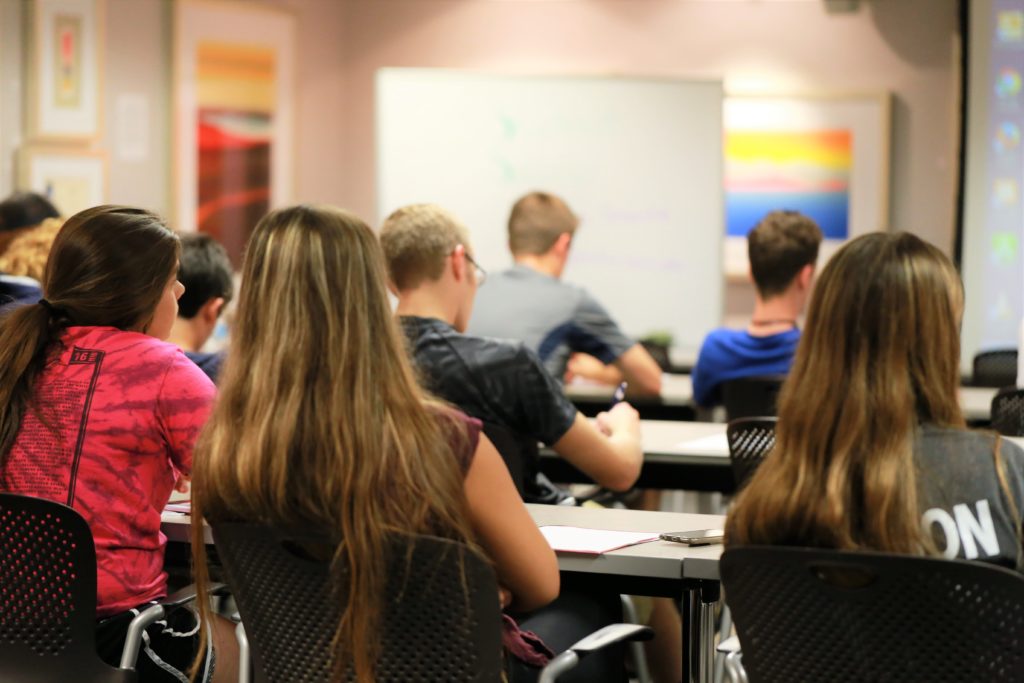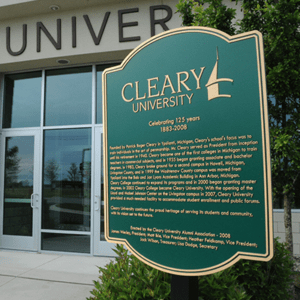Studies show that just 41 percent of U.S. college students say they are ready to enter the workforce upon graduation. Many employers agree with that assessment.

But we hear just the opposite from employers who hire Cleary grads!
What is the Cleary difference, exactly? In this week’s blog, we spoke to recent graduates and Southeast Michigan employers to gain a sense of what we’re doing right at Cleary University in preparing our students to get right to work once they finish their degrees.
Good move #1: We help students find work while they’re in school. Cleary students learn to juggle coursework and part-time jobs, building a strong work ethic.

During her senior year, Heather Henman dove into a full-time job as a mortgage underwriter at United Shore in Pontiac – a position she found through Cleary’s Career Services department. It was Cleary relationships that helped her find the opportunity and prepare to apply.
“It doesn’t matter if it’s an academic advisor or career services – they know you and you don’t get lost in the shuffle,” says Henman, a Waterford resident and summer 2020 graduate. “At Cleary, everyone knows you and what you’re looking for.”

Alexis Whatcott, a 2017 graduate with a bachelor’s in business administration who majored in marketing and new media, paved the way for her eventual career with the Michigan Jaguars FC by starting a part-time job coaching. A former Cleary soccer player, Whatcott, a Howell resident who came from Lapeer originally, began coaching at a high school, a position she got through a teammate’s mother. That job led her to the Jags, where she is now the marketing coordinator. “Playing soccer at Cleary really opened that door,” she says.
Good move #2: Cleary classes feature case studies about real-world companies.
With deep relationships in the community, Cleary courses often give students exposure to entrepreneurs, business leaders, and companies doing innovative things in Southeast Michigan.
Henman likes how Cleary courses “bring in real life experience, looking into currently operating businesses, what’s worked for them, what are some pitfalls, you’re studying those and analyzing that. I feel like I know more about real businesses and what they’ve done than some of my coworkers who recently graduated,” she says.
Good move #3: Cleary customizes programs to meet student needs.
Angela MacDonald had the unique opportunity to obtain her MBA at Cleary thanks to a partnership between her employer, Lake Trust Credit Union, and Cleary. The customized leadership development MBA program featured a cohort of 15, where Lake Trust paid 80 percent of participants’ schooling fees, says MacDonald, who is now the talent, growth, and performance manager for Lake Trust’s HR team.

“Lake Trust was one of the first groups that Cleary tailored a curriculum to what we needed,” MacDonald says. Courses that are part of a normal MBA were tweaked to meet the needs of those working at a financial institution. Cleary’s “entrepreneurial mindset” helps to make a first-rate education focus directly on the needs of its students, she notes.
MacDonald graduated in 2016, and Lake Trust continues to send employees through this unique program. Programs like this one abound at Cleary, where partnering with industry to provide professional development and education to employees as a benefit of employment is part of the way we create mutual benefit.
Good move #4: Cleary instructors – and many students – are also working professionals, bringing real workplace experience into the classroom.
A 2011 graduate, Danielle Boote attended Cleary as a working adult who went back to school to complete her degree. She was already employed as a brand manager and loan officer with Highlands Residential Mortgage.

Now, the Brighton resident’s daughter is a traditional undergraduate at Cleary, so Boote can see the strengths Cleary offers to both populations of students.
“Many traditional college students today didn’t have part-time jobs in high school and some don’t in college,” Boote says. “These early jobs build confidence and marketable skills. They learn how to work with the public and with coworkers.”
At Cleary, students “are using tools that I use in my business world today,” she says. “They’re not just talking about them; they’re doing real world things, which helps them prepare for the work world. All the degrees in the world don’t mean much if you can’t have a conversation with another adult in a business or work setting.”
Good move #5: We teach about culture and emotional awareness.
“I don’t think I’ve ever met a Cleary student that I didn’t love,” says Tara Houle, Executive Talent Specialist at United Shore. “They’re always down to earth, pleasant, professional. They seem prepared, they seem like they care, and they’re excited.”

Houle appreciates the Cleary coursework around culture and emotional awareness, which she believes builds perspective and a sense of realism. “Cleary graduates don’t have an I-deserve-this attitude; they’re not fearful,” she says. They know what it means to get to work, and they’re not expecting any shortcuts or special favors. “They’re hungry; they want it, without being overly cocky.”
Boote adds that Cleary encourages students to discover their passion and then align that with jobs that will be needed in the future. “It’s not just about what feels good. Let’s study the trends in our country and where we think the jobs are going to be,” she says. “Students need to say, ‘What are my interests, what are my talents, and where are the jobs going in 5-10 years.’”



